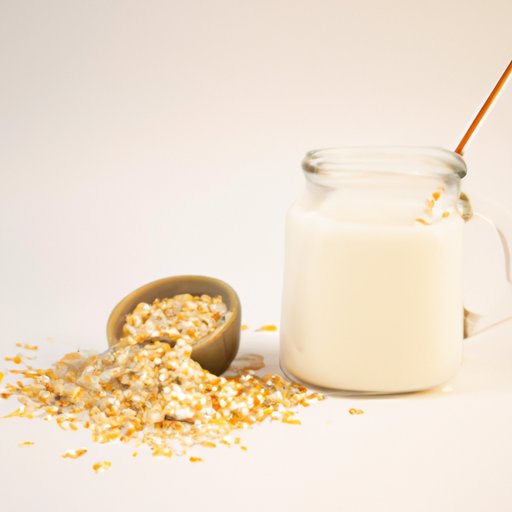
Introduction
Oat milk has become increasingly popular as a dairy-free alternative for those who are lactose intolerant or allergic to dairy. However, there is often confusion regarding whether oat milk is truly dairy-free or not. In this article, we will provide clarity and guidance on the topic, including information on the nutritional value of oat milk, taste comparisons with dairy milk, and potential environmental impacts of dairy-free alternatives.
The Ultimate Guide to Understanding if Oat Milk is Truly Dairy-Free
Dairy is defined as any product that is derived from milk, including cheese, yogurt, and butter. Oat milk is considered a dairy-free alternative because it does not contain lactose, the sugar found in milk, or casein, a protein in milk.
Oat milk is made by soaking and blending oats with water and then straining the mixture through a cheesecloth or fine mesh sieve. Oat milk also contains additional ingredients such as oil, salt, and sweeteners to enhance flavor and texture. However, it is important to note that some oat milk brands may contain traces of dairy if they are made in facilities that also process dairy products. To ensure that your oat milk is dairy-free, it is recommended to look for brands that are certified as dairy-free and free from cross-contamination risks.
The Truth About Oat Milk: Is it a Viable Substitute for Dairy Milk?
When it comes to nutritional value, oat milk is lower in calories and fat compared to whole dairy milk. Oat milk is also a good source of fiber and essential nutrients such as calcium, vitamin D, and iron.
Oat milk can be used as a substitute for dairy milk in various recipes, including baked goods, smoothies, and coffee drinks. However, it is important to note that oat milk has a slightly different taste and texture compared to dairy milk. Oat milk has a slightly sweet and nutty flavor and a thinner consistency compared to dairy milk.
Oat Milk vs. Dairy Milk: Which is the Healthier Choice?
In terms of nutritional value, oat milk and dairy milk have their respective advantages and drawbacks. Oat milk is lower in calories and fat, making it a good option for those looking for a lower calorie alternative. On the other hand, dairy milk is a good source of protein and contains nutrients such as vitamin B12 and phosphorus that are not found in oat milk.
The choice between oat milk and dairy milk depends on individual dietary needs and preferences. For those who are looking to reduce their intake of animal products, oat milk is a viable and nutritious substitute for dairy milk. However, those who are looking to increase their protein intake may want to consider dairy milk as a source of protein.
Going Dairy-Free: A Beginner’s Guide to Switching to Oat Milk
If you are considering making the switch from dairy milk to oat milk, there are a few tips and tricks to keep in mind. Gradually introducing oat milk into your diet can help your palate adjust to the taste and texture of oat milk. It is also important to read labels carefully to ensure that your oat milk is certified as dairy-free and free from cross-contamination risks.
For those who may be lactose intolerant or have a dairy allergy, oat milk is a safe and nutritious alternative. Switching to oat milk can also have potential environmental benefits, as dairy production is a significant contributor to greenhouse gas emissions and water usage.
5 Scrumptious Recipes to Make with Dairy-Free Oat Milk
Looking for recipe ideas to use with oat milk? Here are five delicious options:
- Oat Milk Mac and Cheese
- Blueberry Oat Milk Pancakes
- Spiced Oat Milk Latte
- Vegan Oat Milk Alfredo Sauce
- Oat Milk Vanilla Ice Cream
These recipes, which cater to different tastes and dietary needs, demonstrate the versatility and potential of oat milk as a dairy-free ingredient.
Oat Milk and the Environment: How it Compares to Dairy Milk
When it comes to environmental impact, dairy production has a significant carbon footprint and water usage. Oat milk, on the other hand, has a lower carbon footprint and requires less water to produce compared to dairy milk. In addition, choosing dairy-free alternatives can help reduce reliance on animal agriculture, which is a leading cause of deforestation and land use change.
Making conscious food choices, such as switching to oat milk, can have significant positive impacts on the environment and contribute to a more sustainable food system.
Oat Milk: The Future of Dairy-Free Alternatives?
As more people embrace dairy-free alternatives, oat milk has become increasingly popular and widely available. With its nutritional value, versatile uses, and potential environmental benefits, oat milk is poised to become a long-term and viable alternative to dairy milk.
Conclusion
In conclusion, oat milk is a dairy-free alternative that offers a range of nutritional benefits and potential environmental impacts. Whether you are looking for a lower calorie alternative to dairy milk or a vegan substitute for your baked goods, oat milk is a versatile and healthy option to consider.





